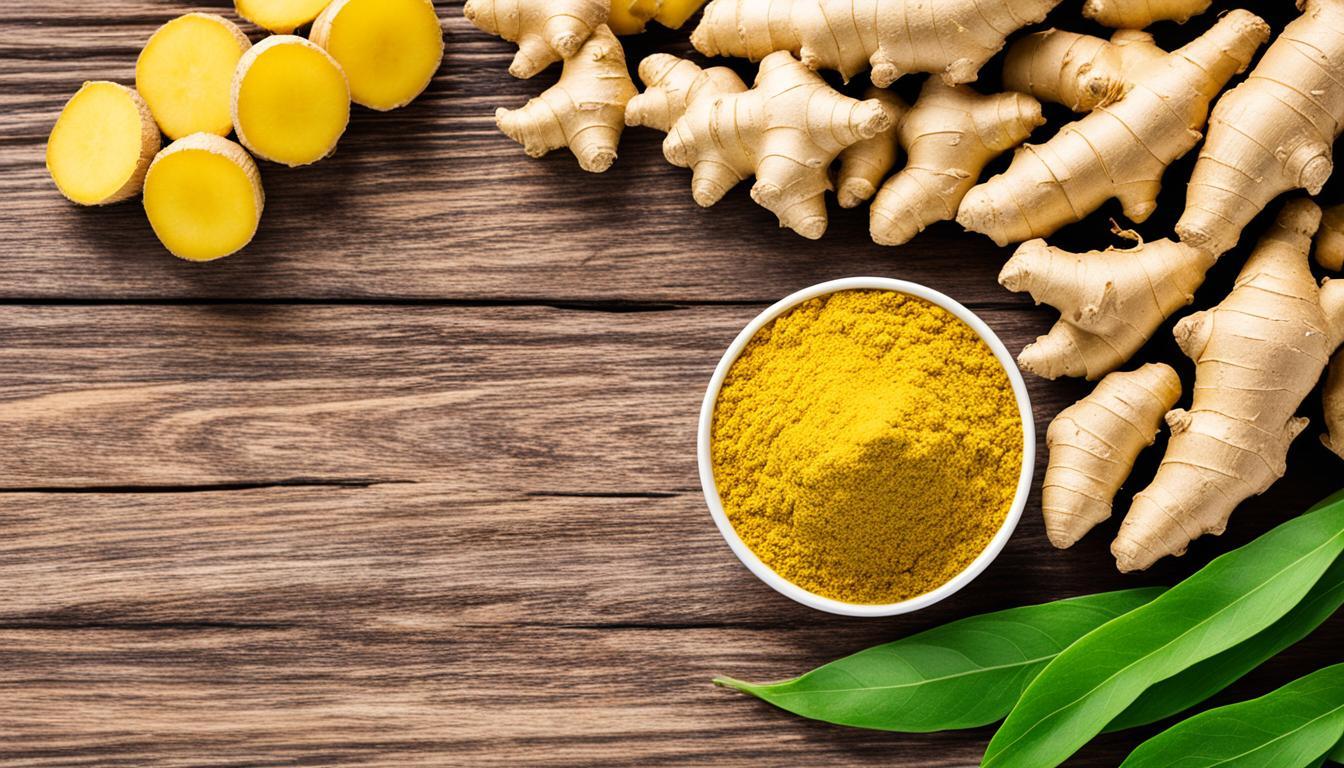Unlocking the Nutritional Benefits of Ginger

Did you know that ginger, originating from Southeast Asia, offers not only a delicious flavor but also a wide range of nutritional benefits? This humble spice has a rich historical tapestry and is packed with essential nutrients, vitamins, minerals, and antioxidants that can enhance your health and well-being. From aiding digestion to fortifying the immune system, ginger has been revered for centuries for its medicinal properties. In this article, we will delve deeper into the surprising nutritional benefits of ginger and explore how it can be incorporated into your diet.
Key Takeaways:
- Ginger, originating from Southeast Asia, is a flavorful spice with a wide range of nutritional benefits.
- Ginger is packed with essential nutrients, vitamins, minerals, and antioxidants.
- It possesses anti-inflammatory and analgesic properties, fortifies the immune system, and promotes cardiovascular and glycemic wellness.
- Ginger can be easily incorporated into your diet through various methods like adding it to meals, making ginger tea, and using it in baking.
- While ginger offers numerous health benefits, it's important to be aware of any precautions and possible side effects.
Ginger’s Rich Historical Tapestry of Health and Flavor
Ginger has a rich historical background dating back over 5,000 years, with its roots in ancient China and India, where it was highly valued for its healing properties. It was also recognized by the ancient Greeks and Romans for its medicinal benefits.
The Global Journey of Ginger from Ancient Remedies to Modern Superfood
Throughout history, ginger has been a staple spice in various cuisines around the world. Its versatility and flavor have made it a beloved ingredient in both savory and sweet dishes. However, ginger's value goes beyond its culinary uses.
"Ginger has been used to aid digestion, reduce inflammation, and support the immune system."
The medicinal uses of ginger have been prevalent in ancient remedies, where it was relied upon for its many health properties. From relieving digestive ailments to reducing inflammation, ginger has been recognized for its therapeutic benefits.
Understanding Gingerol: The Key to Ginger’s Powerful Health Properties
At the core of ginger's health properties is a compound called gingerol. Gingerol is responsible for many of the powerful effects ginger has on the body.
Gingerol's Health Properties |
Gingerol exhibits anti-inflammatory properties, making ginger effective in reducing inflammation and pain. |
Gingerol is also known for its antioxidant benefits, helping to protect the body from oxidative stress. |
Gingerol provides immune system support, helping to strengthen the body's natural defenses. |
Gingerol aids in digestion, promoting a healthy digestive system. |
Gingerol has been linked to weight loss by enhancing metabolism and reducing appetite. |
By understanding gingerol and its role in ginger's powerful health properties, we can fully appreciate the benefits that ginger offers for our overall well-being.
Exploring Ginger's Digestive Health Breakthroughs
Ginger has long been recognized for its positive effects on digestion. It can accelerate stomach emptying, providing relief from indigestion and related discomfort. Ginger is also effective in preventing nausea, making it a natural remedy for morning sickness and motion sickness. The compounds in ginger, such as gingerol and shogaol, play a crucial role in soothing the digestive tract, improving overall digestive health, and alleviating gastrointestinal issues.

Nutritional Benefits of Ginger
Ginger's Essential Nutrients: Vitamins, Minerals, and More
Ginger is not only known for its flavor but also for its extensive nutritional benefits. It is packed with essential nutrients including vitamins such as vitamin C, minerals like magnesium, potassium, copper, and manganese, and dietary fiber. These nutrients contribute to various aspects of health, including digestion, immune function, and overall well-being.
Ginger's high vitamin Ccontent helps support the immune system, playing a vital role in keeping us healthy. It also aids in collagen production and iron absorption, contributing to skin health and preventing iron deficiency anemia.
Minerals like magnesium, potassium, copper, and manganese found in ginger are essential for maintaining proper bodily functions. Magnesiumhelps regulate blood pressure, supports bone health, and relaxes muscles, reducing the risk of cramps and spasms. Potassium is crucial for heart health and helps maintain fluid balance. Copper and manganese act as cofactors in numerous enzymatic reactions and promote antioxidant defense systems.
In addition to vitamins and minerals, ginger is a good source of dietary fiber. Fiber is necessary for healthy digestion, promoting bowel regularity and preventing constipation.
Powerful Antioxidants: Ginger's Role in Preventing Free Radical Damage
Ginger is also rich in powerful antioxidants, such as gingerol and other bioactive compounds. Antioxidantsare essential for protecting the body against oxidative stress caused by free radicals. Free radicals are unstable molecules that can damage cells and contribute to chronic diseases, aging, and inflammation.
Ginger's antioxidant properties help neutralize free radicals, reducing the risk of chronic diseases like heart disease, cancer, and neurodegenerative disorders. Antioxidants also promote healthy aging by preventing damage to DNA, proteins, and lipids.
Ginger in Your Diet: Enjoy the Benefits
Incorporating ginger into your diet is easy and can be done in various ways. Here are some suggestions:
- Add freshly grated ginger to stir-fries, soups, and salads for a burst of flavor.
- Brew a cup of ginger tea by steeping grated ginger in hot water.
- Use dried ginger powder in baking recipes, smoothies, or sprinkle it over yogurt or oatmeal.
- Enjoy ginger-infused drinks like ginger ale or ginger kombucha.
It's important to note that ginger in large amounts may cause digestive discomfort or interact with certain medications. If you have any underlying health conditions or are taking medications, it's best to consult with a healthcare professional before incorporating ginger into your diet.
By unlocking the nutritional benefits of ginger, you can enhance your health and well-being while incorporating a versatile and flavorful spice into your daily routine.
The Anti-Inflammatory and Analgesic Power of Ginger
One of the remarkable qualities of ginger is its potent anti-inflammatory properties. This can be attributed to the presence of bioactive compounds, particularly gingerol, which contribute to its medicinal benefits [*ginger anti-inflammatory properties*]. Scientific studies have shown that ginger has the ability to reduce inflammation in the body, making it beneficial for individuals suffering from conditions like arthritis and muscle pain [*ginger benefits for inflammation*].
Ginger's anti-inflammatory benefits extend beyond reducing inflammation. Its analgesic properties make it a natural pain relief option for various types of pain [*ginger root benefits*]. For women experiencing menstrual pain, incorporating ginger into their diet or using ginger supplements may provide relief. Additionally, ginger can help alleviate discomfort associated with osteoarthritis, a common degenerative joint condition [*ginger for inflammation*].
An easy and enjoyable way to experience the anti-inflammatory and analgesic benefits of ginger is by consuming it as a spice in your meals or as a supplement. Ginger can be added to dishes, used to make a soothing ginger tea, or incorporated into baked goods for an extra kick of flavor and health benefits [*ginger spice benefits*]. With its remarkable properties, ginger is an excellent addition to any wellness routine.
Fortifying the Immune System with Ginger
Ginger is not only a flavorful spice, but it also plays a crucial role in supporting and fortifying the immune system. Its immune-boosting properties activate and enhance the body's natural defense mechanisms, helping to fight off infections and prevent illnesses. Incorporating ginger into your diet can provide natural support for a healthy immune system, allowing you to maintain overall well-being and vitality.
Ginger’s Immune-Boosting Capabilities: Natural Defense Strategies
Research has shown that ginger possesses immune-boosting properties that can help strengthen and optimize the immune system. By incorporating ginger into your daily routine, you can stimulate your body's natural defense strategies, empowering it to ward off harmful bacteria, viruses, and other pathogens. Whether consumed in food, tea, or as a supplement, ginger can support a healthy immune response and help you stay well.
Antimicrobial Properties: How Ginger Helps in Fighting Infections
In addition to its immune-boosting capabilities, ginger also exhibits antimicrobial properties that make it effective against certain bacteria and viruses. The active compounds found in ginger, such as gingerol, have antimicrobial effects, which means they can help inhibit the growth and spread of harmful microorganisms. By consuming ginger regularly, you can give your body an extra line of defense against common infections, including those responsible for colds and flu.
Ginger plays a vital role in supporting and strengthening the immune system. Its immune-boosting properties and antimicrobial effects make it a valuable addition to your diet. By incorporating ginger into your everyday meals and beverages, you can naturally fortify your immune system and promote overall health and wellness.
Cardiovascular and Glycemic Wellness: The Impact of Ginger
Ginger is not only a delicious spice but also a powerful ally in promoting cardiovascular and glycemic wellness. Incorporating ginger into your diet can have numerous benefits for your heart health, cholesterol levels, blood pressure, and blood sugar control.
Studies have shown that ginger has cardio-protective properties, making it useful in lowering the risk of heart disease. It can help reduce LDL cholesterol levels, commonly known as "bad" cholesterol, and increase HDL cholesterol levels, often referred to as "good" cholesterol.
Ginger's ability to lower blood pressure is another valuable asset for cardiovascular health. High blood pressure is a risk factor for heart disease, stroke, and other cardiovascular conditions. By including ginger in your diet, you can support healthy blood pressure levels and reduce the risk of these diseases.
Moreover, ginger shows potential in regulating blood sugar levels, making it beneficial for individuals with diabetes or those at risk of developing the condition. By incorporating ginger into your meals or enjoying it as a beverage, you can improve glycemic control and enhance your overall well-being.
To further underscore the impact of ginger on cardiovascular and glycemic wellness, a recent study conducted at the University of Tehran demonstrated that ginger supplementation led to significant reductions in fasting blood sugar, hemoglobin A1C levels, and insulin resistance in individuals with type 2 diabetes.
By adding ginger to your daily routine, you can take proactive steps towards maintaining a healthy cardiovascular system, managing cholesterol levels, controlling blood pressure, and regulating blood sugar levels. Embrace the natural benefits of ginger for a healthier and more vibrant life.
Conclusion
Ginger is a remarkable spice that offers a multitude of health benefits. Throughout history, ginger's medicinal properties have been celebrated, and today, we have scientific evidence to support its efficacy. From its digestive health breakthroughs to its immune-boosting capabilities, ginger has proven to be a valuable addition to our wellness routines.
One of the key advantages of ginger is its rich nutritional profile. Packed with essential nutrients such as vitamins, minerals, and dietary fiber, ginger supports various aspects of our health, including digestion and immune function. It's also a fantastic source of antioxidants, which help protect our bodies against free radical damage and promote healthy aging.
Incorporating ginger into our diets is easy and enjoyable. We can add it to meals, brew a cup of ginger tea, or use it in baking for a flavorful twist. By unlocking the nutritional benefits of ginger, we can enhance our well-being and make ginger a staple in our daily lives.
So why wait? Let's embrace the amazing benefits of ginger and discover the positive impact it can have on our wellness. By incorporating ginger into our diet, we can experience improved digestion, strengthened immune function, and overall enhanced health and well-being. Ginger truly is nature's gift to us, providing a myriad of nutritional advantages that can transform our lives for the better.
